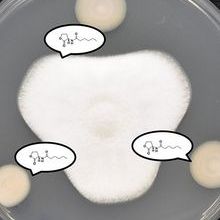Environmental Sensing and Cell-Cell Communication Collection – open for submissions
14 June 2022

This year the Microbiology Society celebrates the 75th anniversary of Microbiology, and 75 years of publishing for the community. As part of this celebration, we will be continuing to release important themed collections, highlighting the breadth of microbiology and showcasing why microbiology matters.
This month, in line with the Cell-Cell Communication in Bacteria: Fundamental and Applied Aspects Focussed Meeting, we are pleased to share the Environmental sensing and cell-cell communication collection which is guest edited by Martin Welch (University of Cambridge) and Anugraha Mathew (University of Zurich).
The last two decades have provided a wealth of new insight into how microbes (prokaryotes and eukaryotes) sense and respond to their surroundings and to one another. Technological advances continue to shape our understanding of this burgeoning field, and this has led to a sea-change in the way in which we view the microbial world. No longer are microbes viewed as being the archetypal single-celled entities; instead, community spirit and coordinated responses are the order of the day. In this special anniversary collection for Microbiology, timed to coincide with the Microbiology Society-sponsored Cell-Cell Communication meeting, Guest Editors Martin Welch (University of Cambridge) and Anugraha Mathew (University of Zurich) aim to assemble a landmark collection of papers that celebrate the interaction of microbes with their environment and with one another.
Submissions are particularly welcomed on microbial sensing and signalling pathways, quorum sensing (including both intra- and inter-species interactions and other forms of community-wide behaviours), chemoreception, secondary metabolism, and the complex interplay between different sensory pathways.
Explore the articles in the Environmental sensing and cell-cell communication collection. Authors wishing to submit to the collection should do so via the online submission system and note in the cover letter that their submission is intended for the Environmental sensing and cell-cell communication collection. If you have any questions, please contact [email protected].
The Microbiology Society is a not-for-profit publisher, publishing for the community, and we support and invest in the microbiology community. All journal income is invested back into the Society through providing grants, facilitating policy activities, funding conferences and other activities. Support your community by publishing in a Microbiology Society journal.
Image: Anugraha Mathew.
